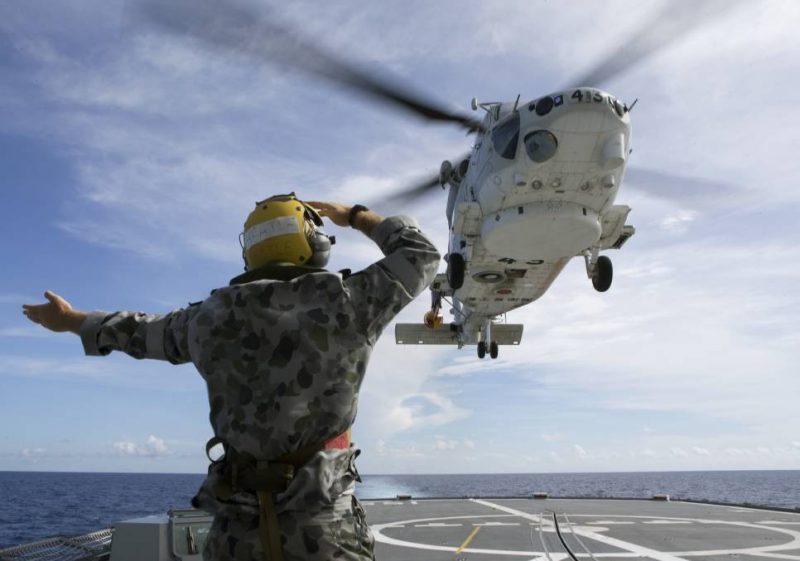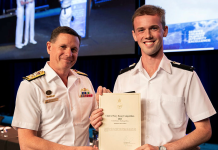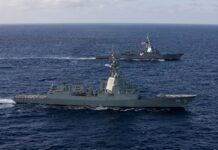
By Nicholas Stuart*
Language matters. New words and phrases create new ways of thinking; new ways of visualising the world. That’s exciting. Unfortunately it can also be very dangerous, because simply using words – no matter how good or concrete they sound – won’t bring one idea into existence. You need reality to change for that to happen.
Which brings us, of course, to the “Indo-Pacific” and, with it, the idea that Australia is some sort of “middle power” acting as a “responsible stakeholder”, a member of the “Quad”, playing by the “rules” of the “international system”. Lovely words and phrases that so readily trip off the tongue.
The secret of such phrases is precisely that they’re so malleable as to be completely meaningless, which is why they’re so beloved of those who are attempting to warp reality to match their own vision of the way things should be.
As concepts these phrases are innocuous, quite impossible to disprove. Their effect, however, is insidious. Using them hands to the ideologues pushing their own barrows their weapon of choice: words. These people are advocates of their own particular version of truth (no matter how divorced from reality this actually is) and they grasp these terms as part of their own take-no-prisoners, no-holds-barred fight to change the world to reflect their innermost beliefs. They love nothing better than to use such phrases to skew the debate before it even begins. What appear to be harmless words are rapidly deployed as building blocks, constructing edifices that have nothing to do with their original meaning. They provide, instead, intellectual backing for ideas that would be rubbished if considered in the cold, rational light of day.
Take “middle power”. It sounds right, doesn’t it, and just like us! That’s because it’s the Goldilocks formulation: not big and boastful, not small and insignificant. It’s just right. But what, exactly, does it mean? And more importantly, what are the corollaries that inevitably follow?
It becomes obvious, for example, that we should have a significant defence force structured to do more than just protect the country. We need to be able to intervene in events offshore because, after all, that’s what middle powers do. And as a responsible stakeholder in the international system, it’s obvious that we should uphold it – even if there is no actual rule-book. And, once you accept Australia is a player in an Indo-Pacific region, it’s not difficult to justify this country has a right – no, obligation – to intervene in events across three quarters of the world.
It provides a foundation for the idea Australia should somehow acquire nuclear weapons; that we have an obligation to get involved in the South China Sea; that it’s only right and proper that we should act as “custodians” of a huge slice of Antarctica; and that we need to spend more and more money on the forces.
Some of these may be quite plausible ideas. The problem is the way proponents are borrowing formulations simply in order to justify conclusions they were always going to come to. They use spurious arguments based on fallacious constructions. All they want to do is get their hands on your wallet and then rifle through securing funds to pay for their pet projects. Always using the plea of ‘necessity’. The problem is the terms don’t make sense.
Australia has a big economy. At (say) US$1.7 trillion it ranks about 14th biggest in the world. That’s big. It’s also small. It’s just over a quarter that of Japan, half that of France or the UK, and in the mix alongside Spain, Russia, Mexico and even, today, Indonesia. Definitely not in the league of countries like Canada, Brazil, Italy or South Korea, all of which are larger than Australia.
OK, so how about population? We rank in the middle – after Cameroon but before Taiwan. Would you consider those middle powers, and if you do, does the term actually have any meaning?
Try armed forces. The Global Firepower’s 2019 index, balancing up all forms of military capability, places Australia at number 19, just behind North Korea. Measures like this are pretty ridiculous, however, because our forces couldn’t even pacify the small province of Uruzgan despite nearly a decade-long deployment. And that’s exactly the point.
Broad-brush formulations are not simply irrelevant, they’re designed to confuse and mislead. They bear no more relation to the real world than other fabrications like “compassionate conservative” or “new Labour”. The problem is that while these latter two were nothing more than comparatively harmless re-branding exercises, using strategic words with imprecision can cost lives.
The Indo-Pacific is a lovely idea, but an imaginary space. Just because the US decided to re-label “Pacific Command” to thrust authority on a new concept, doesn’t mean it exists. These are still two separate oceans. And I’ll believe in the Quad when there’s serious, NATO-like integration between the four members. The reality is that Japan, India, the US and Australia are separate countries with divergent interests. It’s about as solid as a breath of air.
So don’t lose your bearings in a rush of enthusiasm for the new. Instead pause. Hold the buzz-word up for examination. Does it really encapsulate something that exists; or is it just flummery and blancmange, a concocted arrangement of nouns and verbs that evaporates on the tongue like a sugary sweet, leaving no nutrient in its wake?
*Journalist Nicholas Stuart is a long-time defence columnist for Fairfax Media and was an ABC correspondent in several Asian countries. This article first appeared in The Canberra Times.


